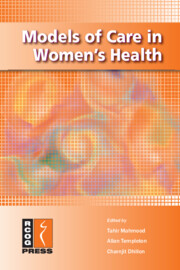Book contents
- Frontmatter
- Contents
- About the authors
- Abbreviations
- Preface
- CHAPTER 1 Setting the scene
- CHAPTER 2 Early pregnancy loss, including ectopic pregnancy and recurrent miscarriage
- CHAPTER 3 Infertility
- CHAPTER 4 Acute gynaecology
- CHAPTER 5 Sexual and reproductive health services
- CHAPTER 6 Termination of pregnancy
- CHAPTER 7 Heavy menstrual bleeding
- CHAPTER 8 Post-reproductive gynaecology
- CHAPTER 9 Urogynaecology
- CHAPTER 10 Vulval disease
- CHAPTER 11 Gynaecological oncology
- CHAPTER 12 Colposcopy services
- CHAPTER 13 Laparoscopic surgery
- CHAPTER 14 Gynaecological risk management
- CHAPTER 15 The role of the clinical director
- CHAPTER 16 Recommendations
- Index
CHAPTER 2 - Early pregnancy loss, including ectopic pregnancy and recurrent miscarriage
Published online by Cambridge University Press: 05 July 2014
- Frontmatter
- Contents
- About the authors
- Abbreviations
- Preface
- CHAPTER 1 Setting the scene
- CHAPTER 2 Early pregnancy loss, including ectopic pregnancy and recurrent miscarriage
- CHAPTER 3 Infertility
- CHAPTER 4 Acute gynaecology
- CHAPTER 5 Sexual and reproductive health services
- CHAPTER 6 Termination of pregnancy
- CHAPTER 7 Heavy menstrual bleeding
- CHAPTER 8 Post-reproductive gynaecology
- CHAPTER 9 Urogynaecology
- CHAPTER 10 Vulval disease
- CHAPTER 11 Gynaecological oncology
- CHAPTER 12 Colposcopy services
- CHAPTER 13 Laparoscopic surgery
- CHAPTER 14 Gynaecological risk management
- CHAPTER 15 The role of the clinical director
- CHAPTER 16 Recommendations
- Index
Summary
Key points
✓ All women with early pregnancy complications should be evaluated in a dedicated early pregnancy unit.
✓ Management should be conducted by trained and competent staff.
✓ Adequate facilities should exist to perform scans and for the measurement of serum beta human chorionic gonadotrophin levels.
✓ Algorithms should be in place to guide the management of spontaneous and recurrent miscarriage and ectopic pregnancy.
✓ Women should be offered an informed choice of management options.
✓ Women should be furnished with written information in non-medical language.
✓ A quiet room conducive to breaking bad news should be located away from the work area.
✓ Bereavement counselling should be offered to all women who suffer a pregnancy loss.
✓ Adherence to local and national standards should be audited regularly.
Introduction
Early pregnancy problems form a major part of all gynaecological emergencies. Early pregnancy loss before 12 weeks of gestation is a common event, which causes a great deal of distress to women and their partners alike. Approximately one in five pregnancies will end in pregnancy loss, which represents a considerable burden on individuals and their healthcare providers.
In the past, women were admitted to the emergency receiving ward and waited for a considerable length of time before undergoing ultrasound scan and clinical assessment. With the appearance of early pregnancy assessment units, an increasing number of women are being assessed and managed as outpatient attenders. The advent of high-resolution transvaginal ultrasound, coupled with the improved access to serum human chorionic gonadotrophin (hCG) measurements, has allowed the development of models of care and improved delivery of care.
Within the UK, the number of early pregnancy assessment units has increased to the extent that over 200 active units are registered with the Association of Early Pregnancy Units (AEPU). The AEPU has set out, since its inception in 2001, to improve the standards of early pregnancy care and to provide a clearer pathway for the patient's journey.
Keywords
- Type
- Chapter
- Information
- Models of Care in Women's Health , pp. 6 - 23Publisher: Cambridge University PressPrint publication year: 2009

